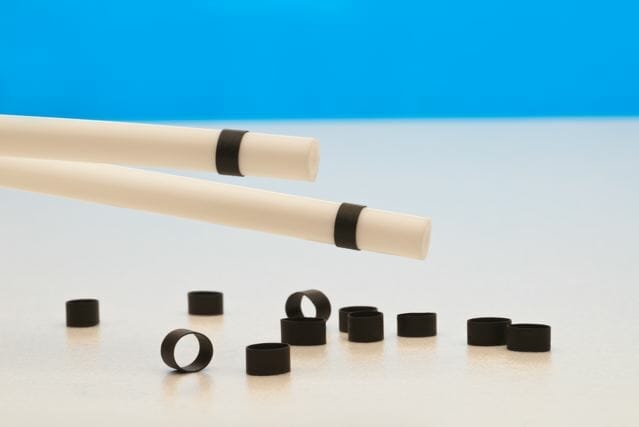DAYVILLE, CT USA – (June 15, 2012) – Putnam Plastics Corporation, a leader in advanced extrusion for minimally invasive medical devices, has developed a line of polymer marker bands for fluoroscopic illumination of catheter tips used in minimally invasive medical procedures. These bands reduce costs by eliminating traditional gold or platinum marker bands and offer greater adhesion to catheter shaft tips.
A traditional marker band is a short, thin-wall tube made from gold or platinum that is placed on the tip of a catheter shaft to provide high levels of visibility under fluoroscopy (radiopacity). This allows surgeons to precisely locate the catheter features deep within the body for deployment of balloons, stents, and other devices in blood vessels.

These metal marker bands require a multi-step forming process to create seamless small diameter tubes. Specialized manufacturing equipment is used to crimp or swage metal bands to the polymer shaft tip such that they do not fall off during the medical procedure. This process is costly and time consuming, and quality controls to ensure sufficient mechanical bonding between these dissimilar materials can be significant.
Putnam’s marker bands are made from tungsten filled polymers, such as nylons, urethanes and thermoplastic elastomers. Bands are customized using the same polymer specified for the catheter shaft to allow heat bonding of the band for a more secure assembly. Tungsten loadings range from 65% to 80% by weight to meet radiopacity requirements. Using proprietary co-extrusion technology, Putnam applies an unfilled polymeric outer surface to these bands similar to the surface of the catheter shaft to ensure minimal trauma to blood vessel walls.
Putnam Plastics offers polymer marker bands with inside diameters ranging from 0.014 inches (0.356mm) to 0.200 inches (5.080mm) and wall thicknesses ranging from 0.002 inches (0.051mm) to 0.030 inches (0.762mm).
“Our thermoplastic composite bands are cut from tubes extruded in a single process, which can provide cost savings and shorten lead times,” said Ray Rilling, General Manager at Putnam. “Plus, our bands offer outstanding radiopacity and can be thermally bonded to shafts for greater quality assurance.”